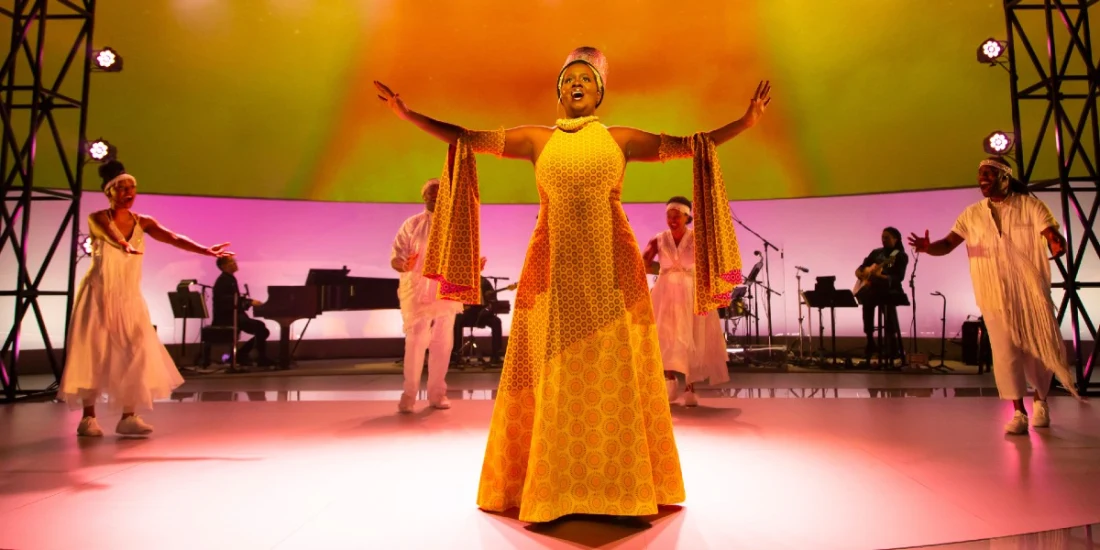'Dreaming Zenzile' review — a simple yet stunning tribute to a singer's legacy
There's a line at the beginning of Dreaming Zenzile, the new musical about South African singer Miriam Makeba, that goes, "Your voice will continue the fight for freedom long after you're gone." Writer/performer Somi Kakoma proves this to be true. Her poetic retelling of the music pioneer's life is simple without being underwritten, hopeful without being kitschy, and celebratory of Makeba's music as well as her activism, leaving the audience inspired to continue her fight for justice and equity.
It's 2008; Obama has just been elected, and Makeba (Kakoma) is glowing with joy and energy. We're in Castel Volturno, Italy, watching her perform a concert. She'd retired years ago, she tells us, but makes exceptions for "very special causes" (in this case, a benefit for the families of South African migrants) — "or very special money." But there's a not-so-subtle sense that this might really be her last performance, as a chorus of four ancestors appear around her, interrupting her performance to repeatedly insist, "It's time."
Indeed, Makeba died of a heart attack during that very concert in real life. But Dreaming Zenzile offers a much more satisfying, if no less sad, interpretation of that event. Makeba pushes back on the ancestors at first, saying she still has so much to give and fight for. But as they take her through her most formative memories, she arrives at a sense of peace and closure, recognizing the fullness of her life and how her voice will indeed outlive her.
An overarching subtlety makes this show work seamlessly. Lileana Blain-Cruz's light-handed direction and Marjani Forte-Saunders's simple but expressive choreography smooth out the transitions between concert snippets and memories so they're nearly unnoticeable, yet completely clear. The show's emotional shifts are just as effortless, from the joy of love to the pain of loss to the urgent anger of activism.
One moment, we see Makeba get mistreated by her first love; the next, we see her falling for her true love under the glow of sunlight (the gorgeous lighting design is by Yi Zhao). Shortly after celebrating the "sweet sound of American jazz" when she first arrives in New York, Makeba is shunned by both the U.S. and South African governments for releasing anti-apartheid music. The realm of her ancestors soon seems like her only true home left, as they remind her by only using her given first name, Zenzile.
That said, Makeba's music, as sung by Kakoma, is utterly joyous throughout. Her energetic, upbeat anthems, like the opening "Iphindlela," will make you want to get up and dance in the aisles. And even her ballads about strife are so soulful that they still buoy the spirit, if only because we know that Makeba survived so much hardship and inspired so many. Kakoma's performance does the same; she's tender, honest, and utterly captivating to watch.
The chorus play multiple characters in addition to the ancestors, all very well. Phindi Wilson, as Makeba's mother among other characters, deserves special mention for her powerhouse voice that all but brings the roof of New York Theatre Workshop down. She and the ancestors sing traditional, prayerful African folk songs in between Makeba's songs, and Wilson's cries alone could shake the gods from the sky.
Dreaming Zenzile falters slightly in its second act, as the cycle between the concert and her ancestors' interruptions, her ancestors' chants, and Makeba's memories becomes somewhat redundant. Overall, though, this bio-musical is an excellent one that feels fresh amid the many others on Broadway and beyond right now. It respectfully and deeply honors its subject matter without lots of spectacle, allowing room for Makeba's spirit and calls to action to shine through.
Photo credit: Naledi Masilo, Phumzile Sojola, Somi Kakoma, Phindi Wilson and Aaron Marcellus in Dreaming Zenzile. (Photo by T. Charles Erickson)
Originally published on
